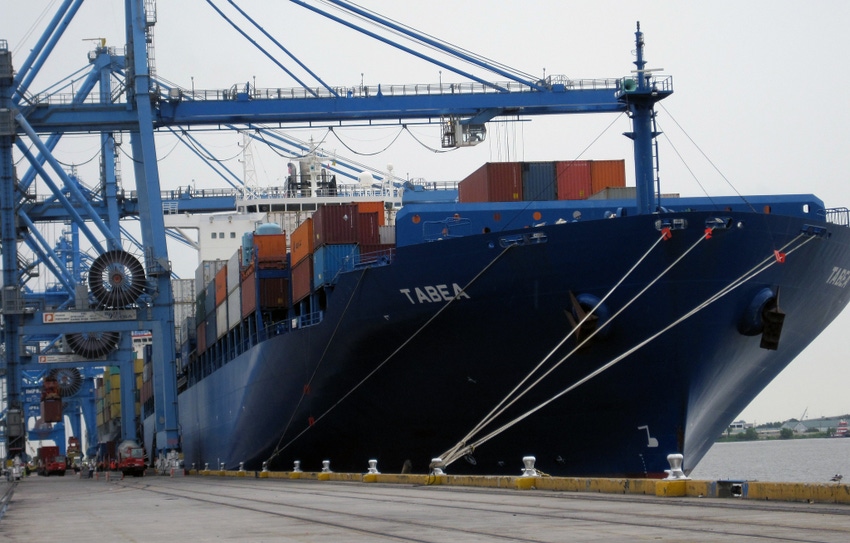
On a trip to discuss and shore up U.S./Mexico agricultural trade, on Friday (July 28) Secretary of Agriculture Sonny Perdue did his best to put distance between his expertise and President Trump’s dislike of NAFTA’s manufacturing provisions.
Asked during a brief press call about Trump’s views on agricultural trade during NAFTA renegotiations, Perdue said he’d not heard anything “specifically. As you heard me state: down here not all sectors have benefited uniformly (under NAFTA). We understand that ag sectors in the United States and Mexico have benefited tremendously under the rules of NAFTA. We know, frankly, that U.S. manufacturing hasn’t and the president is rightly concerned about that.
“How we reconcile those two remains to be seen. … The unfortunate thing is that any trade negotiation is that agriculture is always used as a retaliatory measure and that’s why I’m speaking to all of them – (Trump), Labor Secretary Ross, (Treasury) Secretary Mnuchin, (U.S. Trade Representative Robert) Lighthizer – and asking to do no harm in agricultural sectors.”
What about the U.S. farmworker shortage in light of NAFTA renegotiations?
“That’s really outside (my) purview although it did come up with (Mexican Secretary of Agriculture Jose) Calzada during a press conference when I told them we were working on a program that could provide a legal guest worker program in the United States that could provide their citizens with the opportunity to flow freely, seasonally, temporarily into the United States for work and then come back to visit their families and homelands here.
“So, while we don’t have many details of that we’re bashing around some conversation among ourselves and hoping to have some people at USDA to provide some guidelines. Most of the farmers look to us to help them translate their needs to (the Department of) Labor, (the Department of Homeland Security) and the Secretary of State for visas.
“So, we’re hoping to do that but that’s not an area I don��’t think will be involved in NAFTA renegotiations.”
The Southeast’s fruit and vegetable growers plight with regard to Mexican imports and came up several times. Perdue said he recognizes the problems many growers face.
“Well, we certainly understand not all sectors of U.S. agriculture have benefited equally from NAFTA. Some feel disadvantaged and we understand that. Most of that arises from the complementary aspect of our growing seasons and we must recognize that. There’s an overlap of seasons in areas of Florida, southern Florida, and in some southern latitudes that conflict with the growing season in Mexico.
“One of the questions (from Mexico) is from the grain, corn and soybean growers here. Our statement was when you have NAFTA negotiations you can’t arbitrarily select one sector or the other. Once we have the phytosanitary provisions, the equivalency of safety, we have to recognize and respect the agreement. So, while we understand not all sectors will benefit uniformly that’s unfortunately the problem we have with a comprehensive agreement…
“It’s somewhat difficult although we like to know how we could mitigate and mollify some of the concerns in the fruit and vegetable area. We’ll be looking to do that and would welcome any ideas from the sector as to what we could do to help their situation.”
Queried on claims that Mexico may begin to look away from U.S. crops and towards South America for corn and soybeans, Perdue was largely dismissive. “I didn’t get any indication they’re seriously considering that. Obviously, from the threat of a lack of supply for your nation, we’d do the same if someone were considering withdrawing or cutting off negotiations of a product we depend on for our economy and industry … we’d look for alternative supplies. That’s just what we’d do to protect our own people.
“But I think we have such productive and logistical advantages from the United States to Mexico I think while they may talk about that, act as though they’re having conversations … we’ll continue to advantage of the logistics of rail and water. I’ll be leaving here shortly to go to a port looking at a U.S. ship coming directly from New Orleans to the Yucatan Peninsula that’s used in their pork production here. It’s a great example of the integration of our agricultural sector.
“While they may feel the need to say they’re looking (to other nations) I think we’ve got great history, relationships and supply chains they hope don’t get disrupted.”
About the Author(s)
You May Also Like






